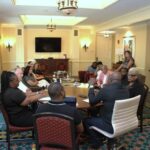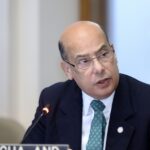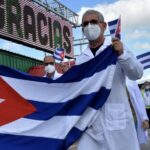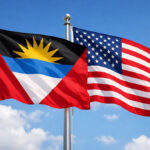Antigua and Barbuda has set out its position on a number of urgent crises facing the world. While delivering his country’s National Statement at the United Nations General Assemblty, Prime Minister Browne spoke of Antigua and Barbuda’s position on the Middle East, Ukraine, Haiti , Counter Narcotics in the Caribbean, Cuba and Global health.
On the issue off the conflict in Gaza in the Middle East, Prime Minister Browne called for the Immediate release of Israeli hostages and voiced condemnation of the genocide and forced removals in Gaza.
The country’s leader also voiced reaffirmation of a two-state solution in line with UN resolutions; and issued Concern over restrictions on participation at the UN, noting the PLO Chairman’s visa denial.
On the matter of the war in Ukraine, Prime Minister Browne called for a return to diplomacy anchored in the UN Charter: “Peace with law is the only peace that lasts.” He said.
On Haiti, Prime Minister Browne voiced his government’s support for one Haitian-led plan, one Security Council mandate, one transparent Haiti Fund, aligning UN, OAS and CARICOM behind a single accountable programme tied to concrete results (roads retaken from gangs, extortion stopped, arms and illicit finance interdicted, civilians protected, services restored).
Addressing the Counter-Narcotics in the Caribbean, Prime Minister Browne said that operations must rest on cooperation and law, with clear legal authority, rules of engagement that minimize risk to life, respect for sovereignty and the law of the sea, and prompt information-sharing and review. He voiced concern over military asset buildups—including a nuclear submarine—that risk escalation: “Our hemisphere should be respected as a zone of peace,” Prime Minister stated.
On the Global Health issue, the Prime Minister called for a push of a UN resolution treating mental health as essential to development, building on Antigua and Barbuda’s OAS initiative; and also called for urgent action on non-communicable diseases—hypertension, diabetes, cancers—which account for the majority of deaths in the Caribbean.
“Mental health is a human right; sanity is the people’s right,” the Prime Minister said. “When we invest in mental health, people recover—and countries rise.”
The issue of Cuba was also addressed by Prime Minister Browne, with him renewing Antigua and Barbuda’s call for normalized relations with the Republic of Cuba, urging an end to the decades-long trade embargo and the removal of Cuba from any so-called terrorism lists.
“For more than sixty years, ordinary Cuban families have borne the weight of an embargo that serves no constructive purpose,” Prime Minister Browne said. “It is time to pivot from punishment to partnership.”
The Prime Minister underscored that labeling Cuba as a “State Sponsor of Terrorism” is a political distortion that obstructs banking channels, trade, medical cooperation, and disaster response across the Caribbean.
“We all know this designation is a hoax,” he stated. “It blocks remittances, crimps legitimate commerce, and undermines regional resilience. It should be lifted—fully and finally.”
Calling for a practical roadmap to normalization, he outlined immediate steps that would tangibly improve lives in the region:
- End the embargo’s financial choke points to restore secure banking, remittances, and correspondent relationships.
- Re-open broad channels for medical and scientific cooperation, including joint training, pharmaceutical research, and public-health exchanges.
- Enable disaster-response collaboration on hurricane forecasting, evacuation logistics, and humanitarian corridors.
- Facilitate clean-energy and grid cooperation—from solar deployment and storage to grid stability and efficiency upgrades.
- Ensure mobility for students, artists, and cultural practitioners, recognizing the deep people-to-people ties across the Caribbean.
“Normalization is not a concession; it is a return to common sense,” Prime Minister Browne added. “Sovereign equality is the bedrock of peaceful relations. When we normalize relations, we unlock dialogue—and with dialogue, solutions.”
He emphasized the broader hemispheric benefit:
“The Caribbean is a zone of peace. Rational, rules-based engagement with Cuba strengthens stability for all of us—economically, socially, and in public health.”
The Prime Minister closed by urging partners to match words with actions:
“If we truly believe this world is ‘better together,’ then let us remove the barriers that keep neighbors apart. Lift the embargo. End the false designations. Open the channels for cooperation that our peoples deserve.”








